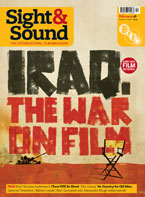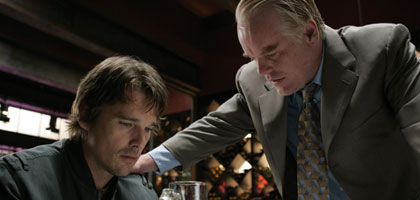Primary navigation


Veteran director Sidney Lumet is back in the hot seat with a heist thriller Before the Devil Knows You're Dead . Here he talks to Geoffrey Macnab about melodrama and terrible people
Right at the start of 83-year-old Sidney Lumet's new film 'Before the Devil Knows You're Dead' there's a jarring sex scene. A man (Philip Seymour Hoffman) is making love to a woman (Marisa Tomei) in an aggressive fashion from behind. The lighting is garish and ugly; the man tends towards obesity and Lumet does nothing to prettify him. And what makes the scene all the more unsettling is that we don't at first know who the couple are or what their relationship is.
"The thing that character wants more than anything," Lumet said recently at the New York Film Festival, "is that kind of fancy sex in an idyllic, away-from-everything set-up. These are the standards he lives by. I felt you had to know that to understand anything about him."
The couple making love are, we discover, husband and wife Andy and Gina Hanson, whose marriage is under intense strain; the scene is supposed to be grotesque, but it is riven with pathos too. It is also clearly intended to jolt audiences who may have thought the octogenarian director had lost his vitality or irreverence. 'Before the Devil Knows You're Dead' is Lumet's 44th or 45th movie - he claims not to know which himself - and it presents a startling contrast to his first feature '12 Angry Men', made in 1957. The fleshy Philip Seymour Hoffman having sex with his wife or stripping down to his vest so his drug dealer can give him his latest fix are images far removed from Henry Fonda's lean, idealistic juror intervening to argue the innocence of a kid accused of killing his father.
That the film was made at all is testament to Lumet's influence on a younger generation of American actors who remember movies like 'Serpico' (1973), 'Dog Day Afternoon' (1975) and 'Prince of the City' (1981). It was largely thanks to Hoffman (fresh from his Oscar for 'Capote') that 'Before the Devil' was greenlit. As his co-star Ethan Hawke said on 'The Stephen Holt Show': "We grew up on Sidney Lumet movies - old-school, gritty New York acting." So it was as if Hawke and Hoffman wanted to conjure a 1970s-style Lumet film into being.
It's hard, however, to identify a consistent visual style in Lumet's work, let alone a set of recurring themes. Thanks to films like those listed above, he's sometimes regarded as a director who excelled in macho, urban crime dramas, especially those set in his native New York, and as a film-maker fascinated by corruption. At the same time, though, he was making stage adaptations ('Long Day's Journey into Night', 1962), an ill-fated musical ('The Wiz', 1978), a traditional Agatha Christie adaptation ('Murder on the Orient Express', 1974) or films with Sean Connery (1965's 'The Hill' and 1972's 'The Offence', to name but two). As he told the 'New York Times' in the early 1980s: "I am constantly being asked, what's the overall theme in your work? But I'm not an intellectual, and if there's a theme I don't want to know it. To me, the death of a great many good creative people has been pretension."
Early Lumet films could occasionally be pretentious and self-conscious too, as with the elliptical editing in 'The Pawnbroker' (1964). But Lumet is, above all, an actors' director. The son of Yiddish actor Baruch Lumet and a former child player himself, he invariably puts his performers first. He has worked with Henry Fonda, Sean Connery, Marlon Brando, Al Pacino, Rod Steiger, Albert Finney, Paul Newman, Richard Burton and Nick Nolte among others, though few of his films have featured female protagonists. In on-set stills he's often shown huddled with his cast, whispering instructions and encouragement. "Good work in movies involves personal exposure, personal risks," he has said, "and the actor is infinitely more exposed than anyone else. Actors are the infantry, the ones in the line of fire."
Lumet approached 'Before the Devil Knows You're Dead' in exactly the same way as if he were mounting a play, beginning with an intensive two-week rehearsal period in which director and actors explored their source material in minute detail. This is the same method he's used on countless other films and is partly a legacy of his days as a 1950s TV director, working on dramas that were broadcast live. "I don't just do it for the actors," he has said. "I draw the whole arc of each character in these rehearsals, and when we finish I've learned more about the work than I've ever known before."
'Before the Devil Knows You're Dead' is more dark and cynical than much of the rest of Lumet's oeuvre, with Kelly Masterson's screenplay combining realism with a self-conscious evocation of those Greek tragedies in which families fall apart in bloody and spectacular fashion. But in many ways it's also quintessential Lumet. He doesn't flatter his actors but he does give them the chance to portray their characters in extraordinary depth. The film is full of shots of grey, sagging flesh, with the close-ups of Seymour Hoffman complemented by equally jarring imagery of the wrinkled torso of Albert Finney as the grieving father who begins to turn against his sons. Andy's brother Hank (Ethan Hawke) isn't so different from the hapless Sonny Wortzik, the bank robber played so memorably by Al Pacino in 'Dog Day Afternoon'. One of life's losers, Hank can't afford to pay child support to his ex-wife or even to subsidise his kids' school outings.
Lumet's fascination with corruption, both personal and professional, is likewise in evidence: this is a film in which everybody is betraying everybody else. Hank is cuckolding his brother. Both Andy and Hank are ready to rob their own parents and Lumet gleefully shows Andy cooking the books at the accountancy firm where he works. Fathers turn on sons. Thieves turn on each other. Andy and Hank can't help but evoke memories of Biff and Happy Loman in Arthur Miller's 'Death of a Salesman': they can't accept that they are failures or that they haven't managed to be the sons their father wanted, hence their decision to countenance deeds that risk ruining not only their own lives but those of everyone close to them. Theirs is a very American tragedy - their father's only ambition for them was that they should do better than he did; they have failed in this and maybe he's to blame.
Geoffrey Macnab: What was the thinking behind the sex scene that opens the movie, which I believe was your own addition to the script?
Sidney Lumet: These are terrible people and I wanted to get the audience to understand a little bit of what drives them. Here is a man who wants sex in total freedom, away from his work, away from anybody he knows - he needs that kind of fantasy isolation.
GM: Why did you make Andy and Hank brothers, not friends as in the script?
SL: Melodrama is so interesting. Now, at least in this country, it's frowned upon, but I don't feel that way. If I'd been in Athens on that afternoon, sitting on a stone step watching a guy come out with both his eyes plucked out and blood running down his cheek, holding two daughters he had sired with his mother, I would have thought that was fairly melodramatic. The line between melodrama and tragedy is very fine and sometimes they overlap. In this instance I felt the way to get the audience involved was to make the stakes as high as I could and to play it at the highest intensity. Their being brothers did that for me immediately.
GM: Are audiences revolted by these characters?
SL: I don't know. From the conversations I've had and some of the reviews, there seems to be a big identification with these people. Maybe times have changed. Bless Jonathan Demme, who in 'Silence of the Lambs' made a movie about a man who eats people and a girl who's frightened of her own shadow and not only got you to care about the two of them but even had a perverse little romance going on.
GM: Was it your own idea to use a non-linear narrative style, with flashbacks and recaps of the same scenes from different points of view?
SL: That came with the script. I thought it was wonderful in terms of accumulating the intensity the picture had to have.
GM: You shot 'Before the Devil...' on HD. Don't you miss old-fashioned film?
SL: I've been working on HD now for about five years. To me it's a godsend. Most directors get angry and impatient at the huge machine that working on film requires. Of course, there are a hundred years of glorious photography on film, but this is an advance, the next step forward. It has enormous advantages: much greater depth of field and you need far less light. Plus no film stock I've ever worked with can give me the same blue in the sky or green grass that my eye sees - the shift in colour that happens in film can be extremely beautiful but it's defeating where you need a naturalistic look. With HD you have far more control. On a great many pictures you go six or seven prints before you've got the right colour combination and then god help you if the lab isn't functioning well that day because you can still get lousy prints. None of that happens with high-def.
GM: You've lived through many episodes in US life and politics: the Depression, World War II, the Kennedy murders, Vietnam. How optimistic are you about American society today?
SL: I am not optimistic at all. I think we're at a terrible point in our history and I hope we can turn it around. It's not just politics, but I think people themselves are changing - not only in the US but in Europe as well - and I think television has a lot to do with it. The experience of watching TV is isolating and that isolation keeps growing. There's even the idea that my film will appear on a cell phone - and that's isolation reduced to an image of two by three inches. It's a horrible idea and that increasing isolation is showing up in all aspects of our lives.